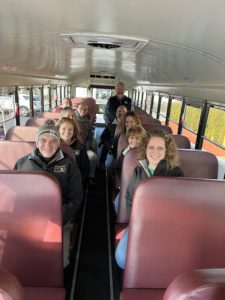Who is a member?
Our members are the local governments of Massachusetts and their elected and appointed leadership.

Weymouth Mayor Robert Hedlund’s Chief of Staff, Ted Langill (standing, back), and Weymouth Food Pantry Executive Director Pamela Denholm (front right) join town and pantry staff and volunteers in the bus that will become a mobile food pantry. (Photo courtesy town of Weymouth)
The town of Weymouth and the Weymouth Food Pantry have joined forces to turn a former school bus into a mobile food pantry, and Mayor Robert Hedlund is committing American Rescue Plan Act funds to do it.
The Weymouth Food Pantry, an independent public charity and hunger-relief organization that already operates on a mobile model, began brainstorming last July about how to improve its service and increase access.
The bus will be outfitted with shelving, refrigerator and freezer units, and storage for about 3,000 pounds of food, a conversion that is expected to be completed by this summer at a cost of about $200,000.
“The Weymouth Food Pantry is the gold standard for providing food assistance,” Hedlund said. “With the need for food access on the rise due to COVID, this mobile pantry project will help us reach even more Weymouth residents and families.”
Like food pantries across the country, the Weymouth Food Pantry saw an increase in demand during the pandemic, while experiencing restrictions to their operations and supplies.
“We’ve had to do with less,” Weymouth Food Pantry Executive Director Pamela Denholm said. “A lot of our volunteers are seniors and more vulnerable groups who needed to stay home, and a lot of our corporate partners paused their volunteer programs. But the need in our community grew.”
About 650 new families have signed up since the pandemic started, she said, a 30-40% increase. The pantry is open weekly, and people can come once a week. Prior to the pandemic, volunteers were used to seeing people only once or twice a month, Denholm said, but that rate quickly increased to every week. Coupled with food shortages, she said, it has been a challenging couple of years for the pantry.
“We are managing the stress, fears and anxiety of the community and are pivoting for all the changes, which was tough,” Denholm said. “We are a small grassroots organization with fewer resources.”
The Weymouth Food Pantry doesn’t operate a brick-and-mortar location. Instead, it operates pop-ups at three different locations, currently at houses of worship, while distributing about 350,000 pounds of food per year. The pantry plans to use the bus in conjunction with the ongoing pop-ups.
“We find transportation to be a barrier for people who need us, so being mobile lets us get to more people,” Denholm said.
Denholm said she expects the new mobile bus to have a layered impact on the community by offering a more dignified experience for those in need while improving access. The bus can simply be pulled into a parking lot, allowing the pantry to go anywhere at any time, potentially increasing the number of days it is open.
“We now have an opportunity to think about summer lunch programs for kids or holiday programs,” Denholm said. “It’s a contained unit, so it can go anywhere, it can respond to situations, even emergency situations.
“We can be super inventive, and increase access, by building on what we already have.”
The bus will also allow the pantry to be more intentional about the needs of specific members of the community experiencing food insecurity, Denholm noted, by considering age groups, demographics, physical restrictions, and dietary needs.
“For seniors, for example, it could be that they have the food but don’t have the movement to break it down,” Denholm said. “So if we have a senior day at a senior center, we can think about what kind of food, or prepared food, we should have.”
The strong, supportive relationship between the organization and the town, and the shared goal of best serving the community, made the project possible, she said.
“This is a really wonderful partnership,” Denholm said. “When municipal and nonprofit collaborate, we can do anything.”